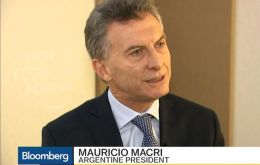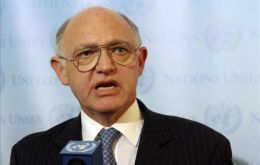MercoPress. South Atlantic News Agency
Tag: Argentina default
-
Thursday, March 4th 2021 - 07:07 UTC
Argentina and the IMF: Another Default in the Works?

By Arturo Porzecanski (*) The following was published in the Americas Quarterly, a contribution from a leading emerging-market economist writes. The seeds for the latest chapter in Argentina’s long history of confrontations with the International Monetary Fund were planted about a year ago, on the eve of the global pandemic.
-
Thursday, January 9th 2020 - 09:59 UTC
US district judge dismissed lawsuit against Argentina filed by hedge fund Aurelius

A U.S. district judge dismissed a lawsuit filed by New York-based hedge fund Aurelius Capital against Argentina, related to an alleged payment shortfall under securities offerings linked to the country’s gross domestic product.
-
Thursday, August 29th 2019 - 10:50 UTC
Argentina announces it will “re profile” IMF loan and sovereign bonds' maturities

Argentina will negotiate with holders of its sovereign bonds and the International Monetary Fund to extend the maturities of its debt obligations, as a way of ensuring the country's ability to pay, Treasury Minister Hernan Lacunza said on Wednesday.
-
Tuesday, September 25th 2018 - 06:59 UTC
“Zero chance” Argentina will default on its debt next year, Macri tells bankers and investors

President Mauricio Macri said on Monday that Argentina was close to a deal with the International Monetary Fund to bolster a US$ 50 billion credit line, while a government source said US$ 3-US$ 5 billion in additional funds could be announced this week.
-
Thursday, November 12th 2015 - 08:29 UTC
Kirchners' ex minister claims poverty in Argentina is similar to that of the 2001/02 crisis

Argentina's former Secretary of Culture José Nun said that “current poverty” in the country “is similar to that which preceded the 2001/02 crisis”, and underlined that he “would never vote” for the presidential incumbent candidate Daniel Scioli, who was handpicked by outgoing head of state Cristina Fernandez.
-
Friday, September 19th 2014 - 06:20 UTC
Cristina Fernandez blames Griesa and US embassy for “speculative attacks” against her government

President Cristina Fernández de Kirchner assured on Thursday that Argentina is under “permanent speculative attack headed by US Federal judge Thomas Griesa,” and criticized “local vultures who have amplified the offensive to the point of ridicule.”
-
Wednesday, September 17th 2014 - 01:11 UTC
Argentina warns US acting ambassador on 'default' statements and 'deplores lack of support'

United States interim ambassador to Argentina Kevin Sullivan was summoned to foreign minister Hector Timerman's office and was informed of ”the profound and firm rejection of the Argentine government to the US diplomat’s inappropriate statements”, according to the statement from the ministry made public on Tuesday.
-
Wednesday, August 20th 2014 - 09:22 UTC
Nervous Cristina skirts New York court and pledges to service swapped bonds in Argentina

President Cristina Fernandez said on Tuesday her government will move to service its defaulted debt in Argentina or allow bondholders to swap their bonds for new bonds governed by national law in order to get around a U.S. court order.
-
Saturday, August 16th 2014 - 11:32 UTC
Trust in Argentine reliability has vanished, as a result of the bonds' litigation

Debt talks on Argentina’s defaulted bonds in the hands of holdout hedge funds ultimately collapsed this week due to disagreements over prices and the absence of a government guarantee to honor payments on the paper, sources close to the discussions said.
-
Thursday, August 14th 2014 - 06:34 UTC
Talks between global banks and Argentine creditor hedge fund “collapsed”

Talks between a group of global banks and at least one major hedge fund about buying a portion of the fund's exposure to Argentine debt have collapsed, a person familiar with the matter told sources in Buenos Aires, amid concerns that the Argentine government has dug in to its refusal to pay certain creditors what they are owed and may not relent for months to come.
